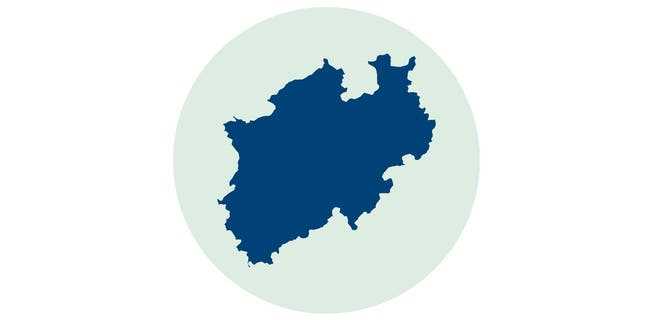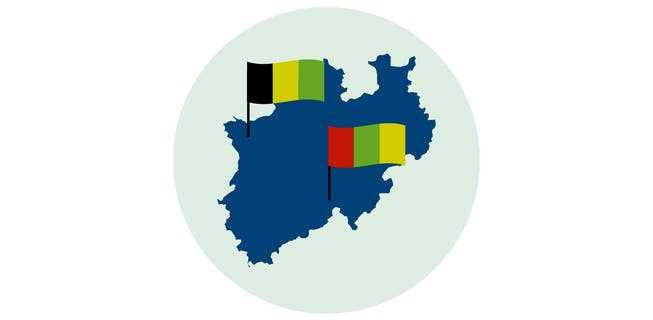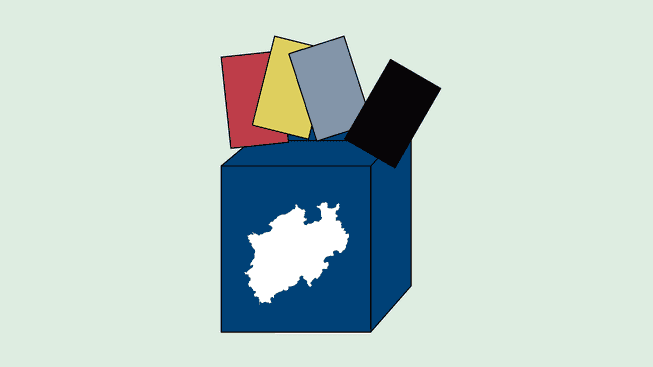Can Prime Minister Hendrik Wüst keep his office? What are the burning issues? And what kind of coalitions are conceivable? The most important questions and answers before the election in Germany’s most populous federal state.
The election in North Rhine-Westphalia is the most important of all state elections, it is considered a “small federal election”. The state is full of contrasts and tensions. Governments are usually voted out after five years. A black-yellow coalition is currently governing, led by the Christian Democrat Hendrik Wüst.

It is the most populous but not the largest federal state. Around 18 million people crowd here, twice as many as in Switzerland, but in an area that is one eighth smaller. North Rhine-Westphalia is diverse – it is characterized by old industrial culture with the Ruhr area, but also by agriculture, it has the most large cities, and because many people want to get around, they are constantly stuck in traffic jams on the notorious motorways. Last year, the traffic jams added up to 240,000 kilometers, costing drivers 106,500 hours of their lives.
The state capital is Düsseldorf, while the largest city is Cologne with the world-famous cathedral. The two cities are bound by a deep enmity. The federal state has many regions, there are ski areas in the Sauerland, castles and palaces in the Rhineland, there are picturesque old towns such as in Aachen or Münster, and the people are different too – the famous carnival is celebrated with good reason by the cheerful and affable Rhinelanders and not them stubborn, heavy-handed Westphalians.

Since October, Christian Democrat Hendrik Wüst has been prime minister and head of a black-yellow coalition that governs stably, although it only has a one-vote majority in the state parliament. Wüst inherited the failed chancellor candidate Armin Laschet, who is now a simple member of parliament in Berlin. So Wüst’s official bonus as head of government is not all that great. Previously, he had been Minister of Transport in the flat country since 2017 – you could also say Minister of Traffic Jams. The youthful-looking lawyer is 46 years old and prefers to ride a bike anyway.
In terms of age, he resembles the beaming winner of the Schleswig-Holstein election, his 48-year-old party colleague Daniel Günther. However, Günther has already ruled for five years and won people over with his integrative and communicative skills. Wüst, on the other hand, sometimes seems a bit bloodless. The pollsters currently see no clear favorites – Wüst is in the polls ahead, but the forecasts are nowhere near as clear as they were before the elections in Schleswig-Holstein last weekend. And the liberal coalition partner is also weakening. On the other hand, the Greens, strengthened by their successful federal ministers Annalena Baerbock and Robert Habeck, could make strong gains and recommend themselves as future coalition partners.

The Prime Minister’s most important challenger is the 53-year-old Social Democrat Thomas Kuchaty. He is a lawyer and was Minister of Justice for seven years until the SPD was voted out in 2017. Kuchaty was the first in his family to graduate from high school; its most important goals are: equal opportunities, social justice and affordable housing. The other top candidates have no prospect of becoming prime minister, but two of them are potential deputies: Liberal Joachim Stamp has been Minister for Children, Family, Refugees and Integration since 2017. It stands for the consistent deportation of foreign threats as well as for a culture of welcoming well-integrated immigrants. The 51-year-old is considered down-to-earth and solid. Since 2017 he has also succeeded German finance minister Christian Lindner at the head of the North Rhine-Westphalian FDP.
The only female top candidate is Mona Neubaur from the Green Party. She comes from Bavaria and is considered to be energetic and eloquent. Her main topic is energy supply. She wants North Rhine-Westphalia to remain an industrial country, “but driven by renewable energies and clean technologies”. With the Greens on the rise, she could move into a new government. Another candidate is Markus Wagner from the currently weakening AfD. Wagner has led the parliamentary group since 2017. He shouldn’t stand a chance.

North Rhine-Westphalia was once the industrial heart of Germany, successful worldwide with the production of coal and steel. But the great decline in industry has long since begun, and the structural change poses problems for the federal state. The administration is not idle, but it can’t get many problems under control – everything is too slow, bureaucratic, like in all of Germany. There is a large social gap, the usual excessive bureaucracy in administration, the technical backwardness of the education system that has become clear during the pandemic, and many migrants.
The flood disaster in mid-July 2021 caused devastating damage, there were 49 fatalities in North Rhine-Westphalia, but some flood victims are still waiting for the promised “unbureaucratic and quick help”. After the flood, the responsible minister went to her second home in Mallorca and took the view that she could deal with the crisis from there. Eventually she had to resign. The Christian Democratic Minister of the Interior, Herbert Reul, was able to score points because he focused on internal security – with a strengthened police force and an intensive fight against clan crime.

After the election, Hendrik Wüst will probably no longer be able to govern in a two-way alliance with the Liberals, but may have to form a so-called Jamaica coalition with Liberals and Greens, as his Schleswig-Holstein colleague Daniel Günther has led for the past five years . Günther no longer has to, but he still wants to continue the successful three-way alliance. In the most recent polls, the CDU comes to 30 to 32 percent and the SPD to 28 to 29 percent. If Wüst succeeds in keeping the state chancellery in Düsseldorf, it would also strengthen Friedrich Merz, the new leader of the German Christian Democrats. Merz comes from North Rhine-Westphalia.
A victory for the SPD, in turn, would bring momentum to Chancellor Olaf Scholz and his traffic light coalition of SPD, Greens and FDP. According to the latest polls, the Greens should reach 16 to 18 percent and increase significantly compared to the 2017 election. With 7 to 8 percent, the FDP threatens to lose approval significantly, but like the right-wing populist AfD, which has poll numbers of 6 to 8 percent, should be back in the state parliament.
It is possible that the outcome of the “small federal election” on Sunday evening will be comparable to that of the real federal election of last September. This also applies to the coalition options: “Jamaica” or “traffic lights” – that’s probably the question. According to a recent survey, however, it could also be enough for an alliance between the SPD and the Greens, even if the CDU becomes the strongest party. The FDP is weakening. If the liberals miss out on entering the state parliament, Wüst could only remain prime minister if he were to form a coalition with the SPD or the Greens. The results of the FDP and the Greens may therefore be decisive for the outcome of the election.
